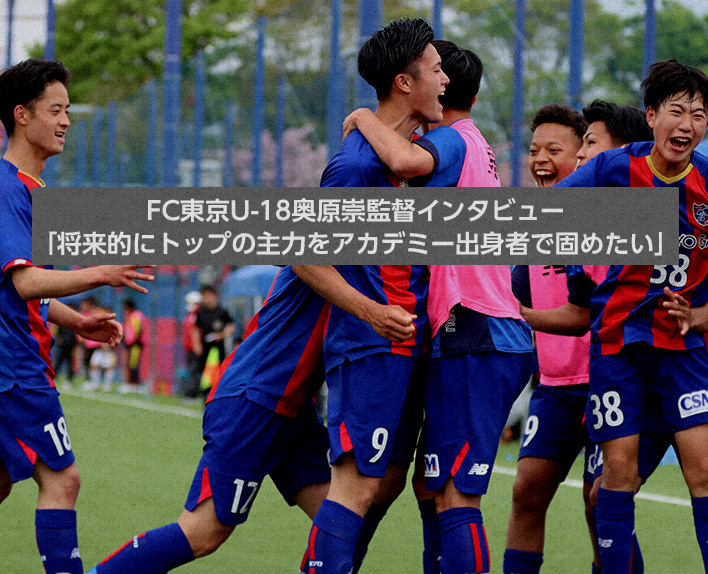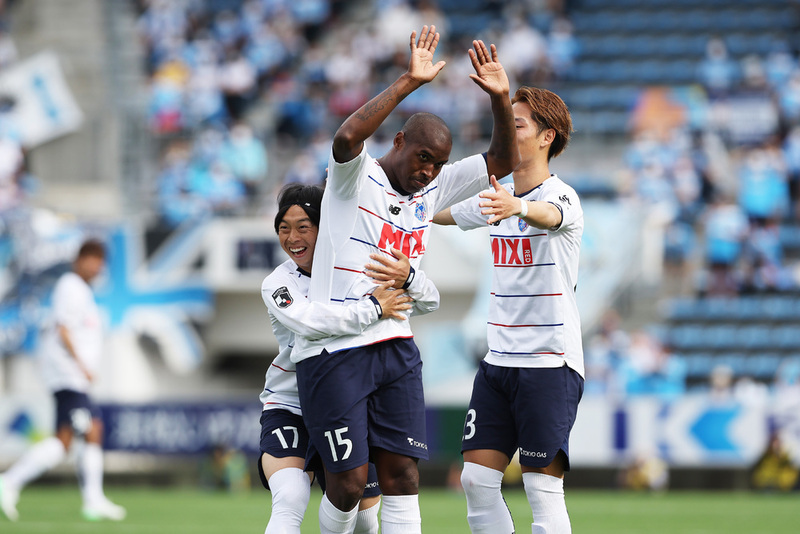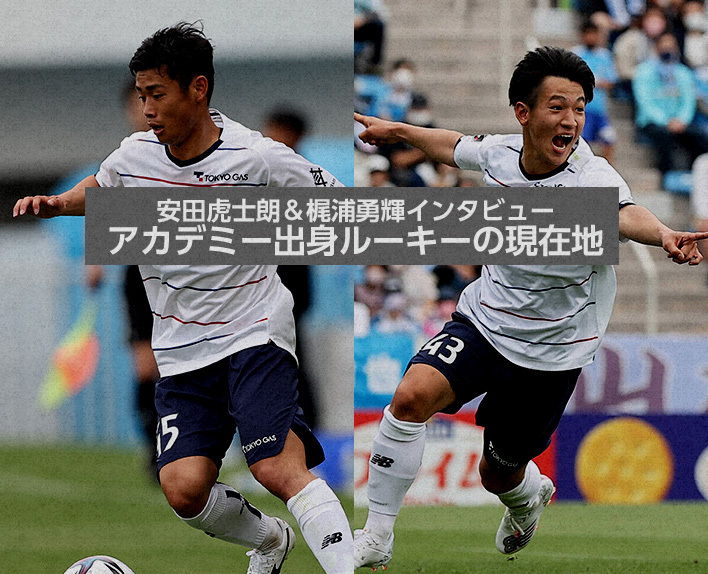FCTokyo U-18 Coach Takashi OKUHARA Interview
"In the future, I want to solidify the top team with players from the academy"

In the J.League YBC Levain Cup, Kojiro YASUDA, who has been promoted from the U-18 this season, was utilized, and Yuki KAJIURA also managed to score a goal. Additionally, Renta HIGASHI and Naoki KUMATA, who are registered as dual players, also had opportunities to play, highlighting the increasing presence of academy graduates in the top team more than ever before. This time, we will hear from Takashi OKUHARA, who served as the Academy Management Director and Academy Director for five years until last season and has taken on the role of U-18 coach this year, discussing various perspectives on the current state of the U-18 team, the status and challenges of the academy, and what kind of presence the players graduating from there should have at FC Tokyo.
Q: Coach Okuhara has returned to coaching for the first time in six seasons since leading the U-15 Fukagawa in the 2016 season. What are your honest thoughts on returning?
A, having served as the General Manager (Academy Director) for five years, I have gained a deep understanding of the positioning of each team within the club and the various factors that support the operations on the ground. With that in mind, I feel a much stronger sense of the weight that the coach must carry in managing the team than I did before.
Q: The role of the coach has changed quite a bit over these six years, hasn't it?
A, yes. The entire club's consistent approach to football has become more pronounced than when I was in Fukagawa. As each J-League club begins to showcase its own identity, I believe it's about how I can contribute to the growth of individuals while adhering to the club's philosophy, so it's exciting to be able to try new things.
Q: Since Coach Okuhara originally wore the number 10 for FC Tokyo, I believe he understands the mindset of this club well. How do you feel about the significance of your role as the U-18 coach?
A, I think there are things to inherit and things to discard. I wonder if those who understand this can have the courage to let go or take on new challenges; that’s where I find the meaning in what I do. I also think that there may come a time when I have to let go of things I have cherished greatly, depending on the circumstances. Knowing the history from the past, I feel that I might be able to do such things.
Q: This season, the U-18 team has made a very strong start in the Premier League. How do you feel about the early stages of the season?
A, of course, we seek results, but the most important thing is to express how much we have been able to encourage the players' development on the field. Since January, we have been working on various things. In that context, we have been saying to the players, 'Let's regain a strong U-18.' They are players who entered the team admiring the era when the current top players were active in the U-18 that won the championship in the PREMIST, during their junior and U-15 days. However, the situation has changed in recent years, and we are trying to regain that status, aiming to become a team that U-15 and school players can look up to as the top category of the academy. I believe the players are doing well.

Q: As you transitioned from the position of director to coach, has there been any change in your approach towards high school players?
When I was observing from a step back, I had ideals like, 'If only we could do this more,' but there are difficulties in actually getting involved. However, to be honest, I thought it might be difficult to improve more technical aspects at the youth level, and that changing the mental side would take time. But as I engage with the players, I feel that they are changing more than I had anticipated.
Q: Specifically, what aspects are beginning to change?
A, Coach Albert PUIG ORTONEDA has said, "If we are going to increase our ball possession rate," then we need to acquire the skills that support that. Last year, when I was observing from the outside, I had the feeling, "How far can we go with technical training?" However, I now feel that "if we build it up carefully, it is indeed possible to acquire the necessary skills to become a professional even at this age."
Goal scored by player Kumada, connected from the goalkeeper
Q: By the way, the U-18 team is doing well this year, isn't it?
A, what I first said was, "It's important to cheer up and play soccer" and "It's not cool to act aloof or try to look good." So, I started with the idea that "since it's a team sport, we should work together with our teammates." I focused on improving the parts where I wanted to step forward but felt crushed by the atmosphere around me, starting with, "Let's speak up loudly" and "Let's greet each other."

Q: Currently, there are 7 U-18 players registered with the top team. In the Levain Cup, Renta HIGASHI and Naoki KUMATA have also played in matches, but how is the current collaboration between the top team and the academy?
A, with Coach Albert PUIG ORTONEDA coming in, there was some anxiety regarding communication since he is a foreign coach, but first of all, he called the players to camp, and he values the academy greatly, so we have been able to share various things. Specifically, we had a meeting with Takayoshi AMMA (head coach), Hiroyuki SHIRAI (individual coach), and myself, along with Higashi, while comparing footage of Higashi's participation in the Levain Cup and his participation in the U-18 Premier. There are slight differences in the defensive methods between the U-18 and the top team, and I learned from that, and we are coordinating closely, so not only the players but also the U-18 staff are learning various things and growing.

Q: How do you feel about the stimulation that players who actually participate in the activities of the top team receive?
A, that's a difficult area as well. There are moments when things improve (laughs), but conversely, misunderstandings can arise, leading to the realization, "Ah, they are losing their humility." Still, it's appreciated as material to stimulate them. Young players are shaken in various ways, so we work to tap into that (laughs).
Q, it's fun to work on that (laughs).
A, that's right. I get complacent quickly (laughs).
Q: Do you talk about the personal growth of players who have moved up from the academy to the top level to the current academy players?
A, I talk about things like, "This player had this kind of approach," or, "This player is not only skilled but also had this kind of personality." When I mention specific names, it makes it feel closer when participating in top-level practice, and because I have interacted with various players, I can share stories about how that player behaved when they were 15 or 18 years old.
Q. The fact that Sodai HASUKAWA, who is at the top, excelled in terms of his character gives the impression that it paved the way for his professional career.
A, Sota's true strength lies exactly there. Even when he was in U-15 Fukagawa, he only got playing opportunities starting in his third year, and it was the same pattern in U-18 and at Meiji University. However, he has demonstrated that if you humbly build up various things, you can ultimately achieve success at that level. In Tokyo, inheriting the mindset of scouts like Kazunori YOSHIMOTO, Sota and Shuto OKANIWA have been engaged in activities close to carrying on that legacy. At the time, I wondered, "Is this really okay?" But considering that they are now facing some challenges at the top level, perhaps it was still insufficient. I hope to incorporate the reasons for this into the current environment, even a little. We have come to understand that if we do not go beyond what we once felt was their limit, it will be extremely difficult for high school or university graduates to become core members of the top team. Although the number of academy graduates promoted to the top team is increasing, there are still few players who become national representatives or move overseas. Addressing these issues is a challenge we must tackle.
Q: In the recent Levain Cup match against Júbilo Iwata, 9 of the members were academy graduates. What position does Coach Okuhara envision for them in the top team moving forward?
A, one aspect is the cost, and to continue competing at the top of J1, we need to consider where to allocate the budget. We will invest in key players, including foreign players, but for the backup positions, we want to solidify them with academy players who will become key or substitute players. I believe we still have enough talent for that, and I feel that is something we must do. Another point is how to create the training atmosphere throughout the year, as various things happen at the Kodaira training ground depending on wins and losses. Whether we are on a losing streak or a winning streak, I have been thinking lately that it is the mission of the academy players to create an atmosphere where training can be effectively conducted even in difficult situations.

Q: Was there a trigger that led you to think that way?
When I think back to the quality of training during a time when there were originally few academy players, even during training when results were not showing, just having Yoshimoto there meant that the atmosphere never dropped below a certain level. I believe it is very important to nurture academy players who can do that. Having experienced the top team myself, there are certainly tough times, and there are moments when the atmosphere cannot be improved, but I think it is indeed important that the players who have come up from the academy can hold their ground during those times.
Q, Mr. Yoshimoto is great.
A, I am intentionally increasing opportunities to converse with Yoshimoto from the East. There are still many aspects that feel like a "facade," but I feel that I am starting to understand a bit of the genuine love for the club and true humility.
Q, by the way, Director Okuhara also calls you 'Yoshimoto', doesn't he? (laughs)
A, yes. Since I was in management, I refer to everyone, including the coaching staff, with the honorific 'san' in a professional context (laughs)
Text by Masashi Tsuchiya (Football Writer)






